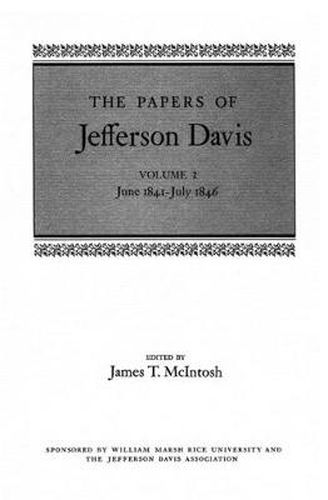Readings Newsletter
Become a Readings Member to make your shopping experience even easier.
Sign in or sign up for free!
You’re not far away from qualifying for FREE standard shipping within Australia
You’ve qualified for FREE standard shipping within Australia
The cart is loading…






The five-year period from 1841 to 1846 saw the beginning of Jefferson Davis’ political career. In this, the second volume of The Papers of Jefferson Davis, the documents cover Davis’ unsuccessful race for the state legislature, his selection as a Democratic state elector, his marriage to Varina Howell, his election to the U.S. House of Representatives, and his departure therefrom to assume command of the First Mississippi Regiment in the Mexican War.
In the congressional documents Davis emerges as a hardworking freshman representative who quickly won for himself the respect and esteem of his fellow congressmen. There were, however, notable exceptions. One such exception was Andrew Johnson, a tailor by trade, who strongly resented Davis’ remark on the floor of the House that a
blacksmith or tailor
could not be expected to achieve the same results in battle as a trained military man. In the somewhat bitter exchange that followed, some have professed to see the beginnings of the long-standing animosity between Johnson and Davis.
The 255 documents in this volume (two appendixes contain undated and late-arriving items) provide a clear picture of Jefferson Davis, the man and the politician, and give an intimate view of Mississippi in the 1840s.
Throughout the volume are rumblings of the then distant storm that was to break so disastrously over the nation in the 1860s.
$9.00 standard shipping within Australia
FREE standard shipping within Australia for orders over $100.00
Express & International shipping calculated at checkout
The five-year period from 1841 to 1846 saw the beginning of Jefferson Davis’ political career. In this, the second volume of The Papers of Jefferson Davis, the documents cover Davis’ unsuccessful race for the state legislature, his selection as a Democratic state elector, his marriage to Varina Howell, his election to the U.S. House of Representatives, and his departure therefrom to assume command of the First Mississippi Regiment in the Mexican War.
In the congressional documents Davis emerges as a hardworking freshman representative who quickly won for himself the respect and esteem of his fellow congressmen. There were, however, notable exceptions. One such exception was Andrew Johnson, a tailor by trade, who strongly resented Davis’ remark on the floor of the House that a
blacksmith or tailor
could not be expected to achieve the same results in battle as a trained military man. In the somewhat bitter exchange that followed, some have professed to see the beginnings of the long-standing animosity between Johnson and Davis.
The 255 documents in this volume (two appendixes contain undated and late-arriving items) provide a clear picture of Jefferson Davis, the man and the politician, and give an intimate view of Mississippi in the 1840s.
Throughout the volume are rumblings of the then distant storm that was to break so disastrously over the nation in the 1860s.